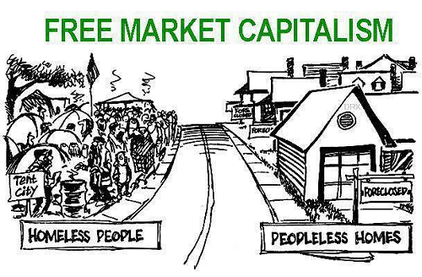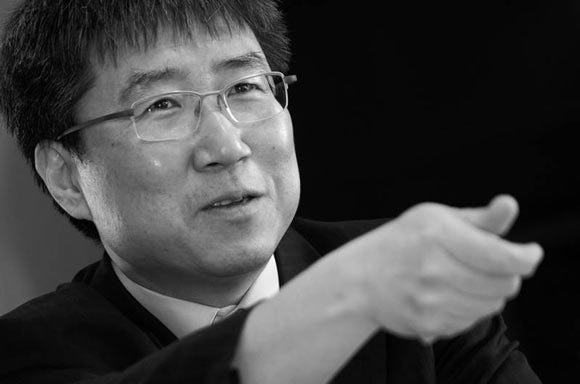They are unjust, inefficient, and bound to crash.

Celebrity stockbroker and failed Senate candidate Peter Schiff (net worth $70 million) said, “The government can’t create jobs; they’ll destroy jobs trying to do it. We need free markets to create jobs; if the government wants to help, they should reduce their burden on the economy.”
Rich people never tire of preaching the importance of free markets. Extreme free market ideology is called neoliberalism and dominates economics in the United States today. Most politicians of both major parties, no matter how conservative on social issues, are neoliberals when it comes to protecting the power of corporations from government restrictions.
Neoliberals believe that the less government regulates or sponsors businesses, and the less financial support they give working people, the better off we will be. Labor will be free to move; capital will be free to grow. In reality, though, unregulated markets have caused tremendous suffering and repeated market crashes, not least the worldwide economic crisis of 2008.
But where are neoliberals wrong? If, as most believe, freedom is good, and markets are good, how can free markets be bad? Haven’t they created the extraordinary wealth we see in the rich countries today?
Actually, no, they haven’t. In his book 23 Things They Don’t Tell You About Capitalism, Dr. Ha-Joon Chang of Cambridge University points out how markets need structure and regulations. “Markets without restrictions are like cars without brakes,” he writes. “They’re bound to keep crashing.”

First of all, Chang says, there is no such thing as a free market. It’s just a public relations term, designed to mislead. “Every market has some boundaries and rules that restrict choice,” Dr. Chang writes. “They only look free because we unconditionally accept their underlying restrictions.”
The question is what rules will markets have and who will decide them. Right now, the richest people control the markets, make the rules, decide how they will be enforced, and change the rules whenever it suits them, as we saw in the recent stock market battle over GameStop. Our markets are only free to our rulers.
What is free and who isn’t
In a free market, are workers free? Neoliberals’ answer is “Yes and No.”
To reduce wages and maximize profits, employers want workers free to wander the world in search of work, but they want immigration kept illegal. That way, desperate people can come and work for poverty wages, and can then be deported if employers don’t need them anymore, if they demand better wages or working conditions, or if political leaders need scapegoats to blame when things get too hard.
The result is constant conflict between immigrant and native-born workers. Likewise, employers oppose any restriction on who can work and in what working conditions. The rich opposed laws against child labor; they oppose regulations on working conditions and fight against minimum wage legislation. If a sawmill worker is willing to risk getting his arm chopped off for $5/hour, who is government to say he can’t do it? ‘Willing’ in this case means too desperate to refuse work, no matter how dangerous.
In neoliberal ‘free markets,’ workers don’t need labor unions. They are free to negotiate with employers as one person against a corporation. They are free to leave if they don’t like how the employer treats them. Many US states have passed “right-to-work” laws, guaranteeing workers freedom from labor unions, part of what capitalists call “labor market flexibility.” Wages and working conditions in those states are, predictably, lower than in more unionized states.
Austerity
Free market economists believe government supports such as welfare, social security, or services of any kind (except police), should be reduced, privatized, or eliminated. Government programs are drags on economic growth, and taxing rich people to pay for them is unfair and inefficient. (Note: government bailouts of banks and corporations are NOT considered violations of market freedom. Only supports for small business and workers are bad. Keep the story straight.)
England’s Margaret Thatcher and Ronald Reagan in the USA led the way in making austerity into national policy. Support for government programs in health care, education, culture or income support used to be mainstream but are now considered radical Left.
Globalization
Global labor markets further imprison workers. We don’t just compete with our neighbors, but with workers all over the world. Corporations move their factories to low-wage countries or bring the low wage workers here. In order to find cheaper labor and looser environmental protections, they negotiate agreements like the North American Free Trade Agreement (NAFTA), the Central American FTA (CAFTA), and hundreds of others. These agreements may bring consumers some cheaper products, but they cost jobs in the rich countries and destroy businesses in the developing countries.
Dr. Chang explains that, “No rich country became rich through free trade. They protected their businesses. After becoming rich, they want poor countries to have free trade with them.” Less-developed countries and new industries need some protection from rich-country competition to get started.

The Living world
Free market advocates want to restrict or eliminate environmental protections. If companies want to dump toxic waste in rivers, cut down or burn whole forests for lumber or cattle ranches, or pollute sensitive wetlands with oil drilling, that should be their right. The rights of poor people, animals, plants, and unborn generations to a healthy environment can’t compete in the free market, because those groups don’t have money.
Making markets work
We need markets, but so-called free markets without restriction and regulation don’t work. We need a system that combines individual initiative with social regulation and control. Here are some ideas from Dr. Chang, former Labor Secretary Robert Reich, and others:
۰ Rip down the edifice of high finance that collapses the productive economy. Ban complex financial derivatives, such as the CDOs and Credit Default Swaps that caused the 2008 crash. Put brakes on the financial economy with transaction taxes and restrictions on capital flows in and out of developing countries.
۰Cut the pay of top executives and increase workers’ pay. We must give up the fiction that people are paid what they are worth; they are paid for their position in a system. CEOs are not 300 times more productive than their workers. Why are they paid so much?
۰ Value work that involves making things, caring for people and environments. People who sit in offices all day should not receive so much more than those who work with their hands. People should not need 16 or 20 years of formal education to find well-paid work.
۰ Government needs to be bigger and do more. Welfare states like Sweden and Norway have healthier and richer economies than free-market economies like the US and UK. Governments make mistakes; they can be corrupted, but they are not solely motivated by shareholder profit.
۰ The world economic system needs to “unfairly” (Chang’s word) favor developing countries. Poor countries must be given more space to protect their businesses, workers, and environment, to regulate foreign investment and ownership, not forced to open their economies to world capitalism before they’re ready.
Dr. Chang says all his suggestions “go against the received wisdom of the last three decades. But, unless we abandon the free-market orthodoxies that have held us back, we will meet continued economic disasters and do nothing to alleviate the poverty and suffering of billions around the world. “
There are more good ideas in Chang’s and other books. We can work on this through union organizing, forming cooperative businesses, and through political action. We can start by simply refusing to believe the free-market myths.
— — — — — — — — — — — — — —
Thanks for reading! Follow me on Twitter, on Facebook here at The Inn by the Healing Path or on Medium.com. Hire me for freelancing, editing, or tutoring on Linked In

Doughnut economics has my vote to replace neoliberalism, and yes, thank you for your good article on the failings of the current standard. https://en.wikipedia.org/wiki/Doughnut_(economic_model) – shall I post this for you in Voices of Humanity?